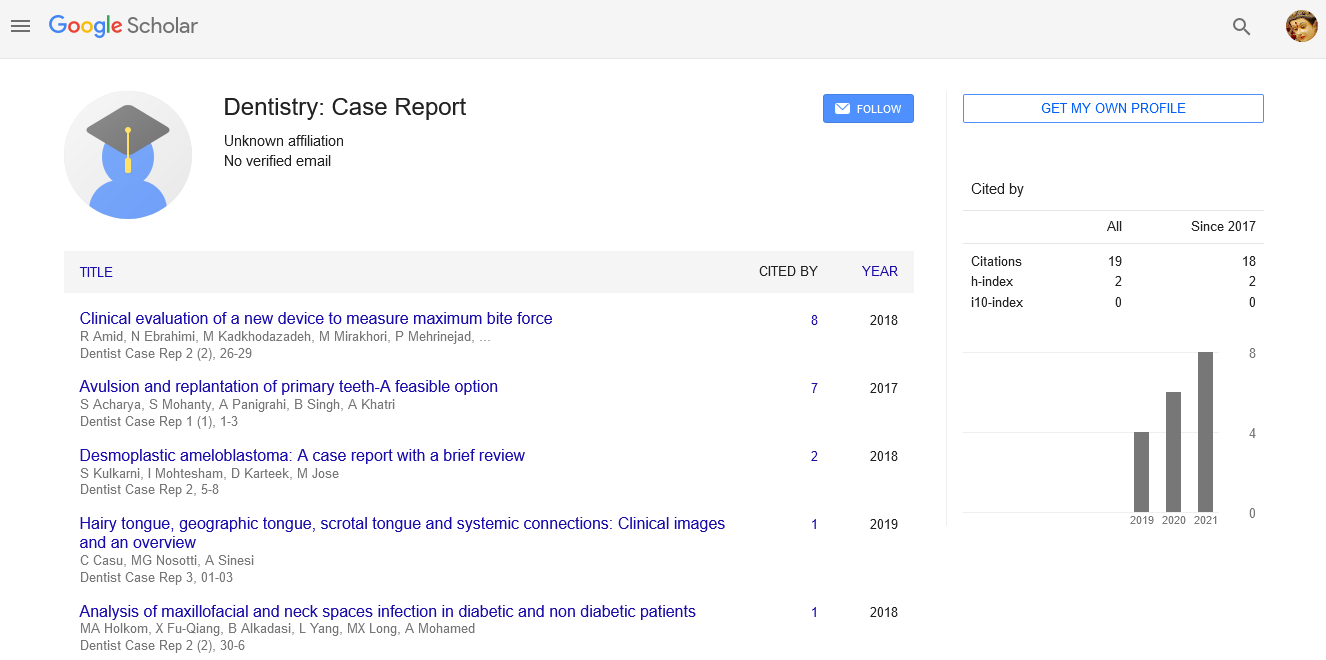Sign up for email alert when new content gets added: Sign up
Optimized approach combining laser capture micro dissection and micro array analysis for regional gene expression profiles of mandibular condylar cartilage
ANNUAL DENTISTRY AND DENTAL SCIENCES CONGRESS
March 02-03, 2020 | Edinburgh, Scotland
Aisha M Basudan
Kind Saud Bin Abdulaziz University for Health Sciences, KSA
ScientificTracks Abstracts: Dentistry Case Report
Abstract :
Mandibular Condylar Cartilage (MCC) is a fibrocartilage that lines the mandibular condyle of the TMJ. Trauma and/or diseases can cause permanent tissue loss and disability; moreover, clinical management via cell-based regenerative therapies is limited due to the paucity of accurate molecular and genetic data. The advent of Micro Array Analysis (MAA) has enabled us to analyze the expression of thousands of genes in a single experiment. However, MAA reliability relies on procuring pure cell populations. Combining Laser-Capture Micro dissection (LCM), which allows precise cells isolation from heterogeneous tissues, and MAA technologies, enables accurate large-scale studies. Objective: of this study is to optimize a method combining LCM and MAA to perform zone-specific gene expression analysis for MCC using 5-week-old rats. Materials and Methods: Two MCC and two Femoral Condylar Cartilages (FCC) specimens were harvested from 5-weekold male SD rat, and then the LCM protocol previously described was applied to collect RNA from FCC (Control) and MCC zones; fibrous (FZ), proliferative (PZ), mature (MZ), and hypertrophic (HZ) zones individually. An optimized approach was established to subject the LCM-RNA samples to two-cycle linear amplification, Biotin-labeling and fragmentation, and then sent to a specialized center to perform microarray hybridization using Affymetrix GeneChip Rat Genome 230 2.0 Array. Results: All quality control measurements at three points; LCM-RNA integrity (before amplification), purity and RNA integrity after amplification, and after fragmentation, revealed high quality that fulfills requirements for the subsequent procedures. Specificity (background) and sensitivity (percentage of genes detected) of the hybridization process were 63.9-74.5 and 54.6- 60.1% respectively, showing higher values than Affymetrix and Arcturus protocols. Likewise, 3′:5′ ratio of mRNA, was 5.5-16.2 for GAPDH, and 11.8-32.9 for β-Actin, indicating the better quality of our samples when compared with other reports. Conclusions: An approach for zonal gene expression analysis of the MCC from 5-week-old rats using LCM and MAA was successfully performed, and a well-supported hypothesis was formulated to distinguish the genes of MCC cells/zones from each other and from articular chondrocytes. Resolving zonal gene expression differences among the cell populations in MCC will enhance basic understanding of fibrocartilage biology and contribute to the future cell-based therapies.
Biography :
Aisha M Basudan, Consultant in Orthodontics, King Abdulaziz Medical City (KAMC), Ministry of National Guard - Health Affairs, Riyadh, Kingdom of Saudi Arabia. Research Scientist, Department of Stem Cell and Regenerative Medicine, King Abdullah International Medical Research Center (KAIMRC), Ministry of National Guard - Health Affairs, Riyadh, Kingdom of Saudi Arabia. She graduated with a Bachelor of Dental Science from King Suad University/College of Dentistry, Saudi Arabia. I also completed my Certificate in Orthodontics and Master of Dental Science degree at the same university. Then she obtained a PhD degree in Tissue Bioengineering field from The University of Hong Kong (2015). She currently works as a Consultant in Orthodontics at King Abdulaziz Medical City and as a Research Scientist at King Abdullah International Research Center, Ministry of National Guard. Her research interest focuses on mandibular condylar cartilage molecular biology and regenerative therapy of related craniofacial anomalies/disease/injuries/abnormal growth patterns.





